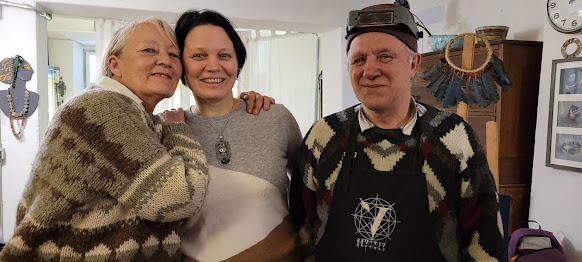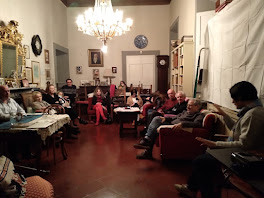The COP27, in itself, wouldn't deserve a comment. It is over, and that's it -- been there, done that, and nobody cared. But I think it is a good occasion to reproduce this text by Stuart B. Hill that nicely explains why we make mistakes all the time when trying to manage complex systems. The COP27, indeed, has been a good example of the concept of "pulling the levers in the wrong direction" as Jay Forrester, the creator of System Dynamics, explained to us. So, here it is. h/t Thorsten Daubenfeld.
10
Common ‘Mistakes’ to Avoid, & ‘Needs’ to Meet, When Seeking to Create
a Better World – Prof Stuart B Hill – 2008 (updated Dec
2012)
Because
of the holistic nature of the approach being advocated, all of the areas below
overlap & are highly interactive & interrelated. This was written in
response to the Commonwealth Government’s announcement of the Australia 2020 Summit in Canberra,
ACT (19-20 April, 2008: http://www.australia2020.gov.au/);
downloadable as a PowerPoint presentation from: www.stuartbhill.com
1.
Getting the
usual ‘experts’ (mostly older males) together to talk & plan
-
always leads to tinkering with existing
(flawed) plans – [‘rearranging the deckchairs on the Titanic’]; & being
trapped in dominant paradigms
-
excludes most, including those affected by such
plans & their ‘fresh’ ideas
Need
-
involve mostly ‘different’ people, including
(if possible) those most affected
-
start by focusing not on plans, but on values,
beliefs, worldviews & paradigms
-
then feelings & passions
-
then, emergent from these, hopes, dreams,
visions, imaginings, & creative thoughts
-
only then can ‘design/redesign-based plans’ be
enabled to emerge (these proactively enable systems [structures &
processes] to meet long-term to short-term, & broad to specific, goals,
& to make systems as ‘problem-proof’ as possible)
-
then critically analyse, integrate, & flesh
these out, etc
-
detail participatory opportunities, responsibilities,
time lines, resource & support needs, means for monitoring outcomes
(feedback), tracking progress, & for ongoing redesigning & fine tuning
2.
Emphasising enemy-oriented,
problem-solving approaches (back-end,
reactive/responsive, curative)
- these tend to focus on symptom management
& neglect the need to address the underlying maldesign & mismanagement
roots of all problems [trying to make systems work that can never work!]
- they typically over-focus on measuring
problems (a main strategy for postponing action - by those who benefit from the
status quo),
- & they usually focus on efficiency
& substitution strategies, e.g., improved application of pesticide & on
finding less disruptive (but still purchased) substitutes, such as biological
controls & genetically modified organisms
-
same story in other areas: medicine, energy,
etc
Need
-
redesign existing systems (& design new
systems) to make them as problem-proof as possible; & to support the
effectiveness of natural controls
-
& to enable effective change from
flawed/defective systems to significantly more improved (sustainable, wellbeing
enabling) ones
3.
Getting
stuck in activities ‘pathologically’ designed to postpone (feared) change
-
particularly measuring problems (‘monitoring
our extinction’)
-
endless over-collection of data (often
‘justified’ by arguments for ‘evidence-based [vs. responsible] approaches’)
-
hearings, committee meetings, report-writing,
etc. [appointment to such committees may be designed to limit one’s influence]
-
most such preoccupations have NO
follow-through, & usually only lead to more of the same
Need
-
postponing ‘pathologies’ must be recognised,
exposed, contradicted & addressed; by taking responsible, timely,
appropriate, collaborative action
-
access to relevant data is needed to make
responsible decisions; however, adequate data are often already available from
other places, in other languages etc.
-
globally, billions of dollars are wasted
annually unnecessarily repeating studies in new locations or with mischievous
intentions (often related to perceived threats to existing commercial &
power advantages)
4.
Trying to
solve problems within the disciplines or areas responsible for creating them; or with
multidisciplinary teams of selected experts/authorities from favoured
disciplines, with others excluded
Need
-
genuine transdisciplinary, trans-competency
& multi-experience teams, able to access disciplinary & specialised
knowledge as needed
-
include competencies relating to holistic
approaches to design, sustainability, wellbeing, meaning & effective change
processes
5.
Patriarchal (them doing
things to/for us, & us doing things to/for them) & ‘driven’ do-good approaches are rarely exactly what is
needed
-
these are generally not embraced by those being
‘helped’, or are not sustained after the helpers leave
-
also, they invariably have diverse negative
unexpected consequences
Need:
-
inclusion of those most affected by proposed
‘improvements’; as primary collaborators in all change processes; & from
beginning to end
-
enables ownership, relevance, achievability,
ongoing improvement & openness to unforseen/surprise benefits
6.
Planning
‘Olympic/mega-scale’, heroic initiatives (from hearings to
projects; talk to action) with no
follow-through or provision for ongoing support (this needs to be more than
just funding)
-
these invariably only reach the analysis,
planning & preliminary stages; & then are abandoned
-
most have unforseen numerous long-term &
widespread harmful side-effects (personal, social, ecological, etc.)
Need
-
diverse, mutually supportive, doable
initiatives that have long-term commitment & support
-
consideration of opportunities for ongoing
improvement & learning our ways forward collaboratively towards improved
futures
7.
Over-focus
on knowledge & data, & neglect of wisdom & experience (most
‘wisdom’ cannot be supported by data; it involves working with the ‘unknown’ – this
is most of what is – not just the limited ‘known’ – often in ways that rely on intuition, ‘right
brain’ & gut feelings, etc.)
Need
-
to be much better at recognising, valuing &
involving the wisest & most experienced in our society, & not so
obsessed with ‘cleverness’ (whereas wisdom enables us to work with the
‘unknown’ & ‘know’, cleverness is limited to working with the
miniscule ‘known’)
8.
Over-focus
on ‘productivity’, profit, power & quick dramatic results
-
predictably leads to burn-out, only short-term,
limited benefits, & often unexpected disbenefits (additional problems that
are often initially unrecognised)
Need:
-
much more focus on rehabilitation &‘maintenance’
activities [sustainable ‘productivity’ is a by-product of this]
-
caring for one another (& other species
& the environment)
-
spontaneous (vs. distractive &
compensatory) celebration – helps validate & spread good ideas &
initiatives
-
venting feelings, & access to support for ‘healing’
our (often denied) psychological wounding, etc.
-
prioritise time & resources for these
activities
-
realising that sustained productivity is
emergent from the effective design & maintenance of whole healthy systems
9.
Homogenisation
tendencies
-
these tend to result in construction of currently
favoured ‘norms’ (for people, structures, processes, etc.)
-
failure to consider diversity &
‘alternatives’
-
creation of favoured in-groups & excluded out-groups
-
also, other expressions of inclusion, exclusion
& blaming
-
failure to benefit from the creativity that
resides at the margins & in the borderlands of society
Need
-
openness to appreciation of the value of heterogeneity
& ‘functional’ diversity within all systems, with its opportunities for
synergy, mutualism…
-
lateral & paradoxical thinking & acting
-
extension beyond the usual competencies
-
relevance to core needs & possibilities
(plus, ‘Testing Questions’ & ‘Integrator Indicators’ for these]
-
a sense of inclusion, ownership, & a sense
of place, etc.
10. Neglect of
the arts,
or only token involvement
-
over-focus on economic (not psycho-social)
growth, the sciences, technologies, business, politics, the professions, the
media, & the other major powerful institutions within our society
-
as a result, the arts are poorly supported,
regarded as a luxury or optional extra, an afterthought, or even irrelevant
Need
-
recognition of the arts, in its broadest sense
(including humour), as being an essential part of both the foundation &
means for implementation of all efforts to achieve genuine & sustainable
improvement
Emeritus Professor Stuart B. Hill | Foundation
Chair of Social Ecology – Mobile: +61 (0)400 081 440
School of Education, Western Sydney University (Kingswood
Campus); Locked Bag 1797, PENRITH, NSW 2751, AUSTRALIA; Location: Building KI,
Room K-2-19A, Kingswood Campus; P: +61 (0)2 4736-0799 | Ext: 2799 (Kingswood
staff only) | Fax: -0400; Email: s.hill@westernsydney.edu.au | Web: http://stuartbhill.com/
Founding
Co-Editor, Journal of Organic Systems: www.organic-systems.org; Latest PPTs: http://stuartbhill.com/ & http://www.scribd.com/doc/55937783
Latest
YouTubes: https://youtu.be/z0SITdQA47g;
www.wakeupsydney.com.au/Interviews/The-SandboxSyndrome.aspx; http://youtu.be/mzY1eZLwOdk; https://vimeo.com/123569201 & https://youtu.be/RdAWokEU64M
westernsydney.edu.au
My latest books are Ecological Pioneers: A Social History of
Australian Ecological Thought and Action (with Dr Martin Mulligan;
Cambridge UP, 2001), Learning for
Sustainable Living: Psychology of Ecological Transformation (with Dr Werner
Sattmann-Frese; Lulu, 2008) and Social Ecology: Applying Ecological
Understanding to our Lives and our Planet (with Dr David Wright and Dr
Catherine Camden-Pratt; Hawthorn,
2011).






